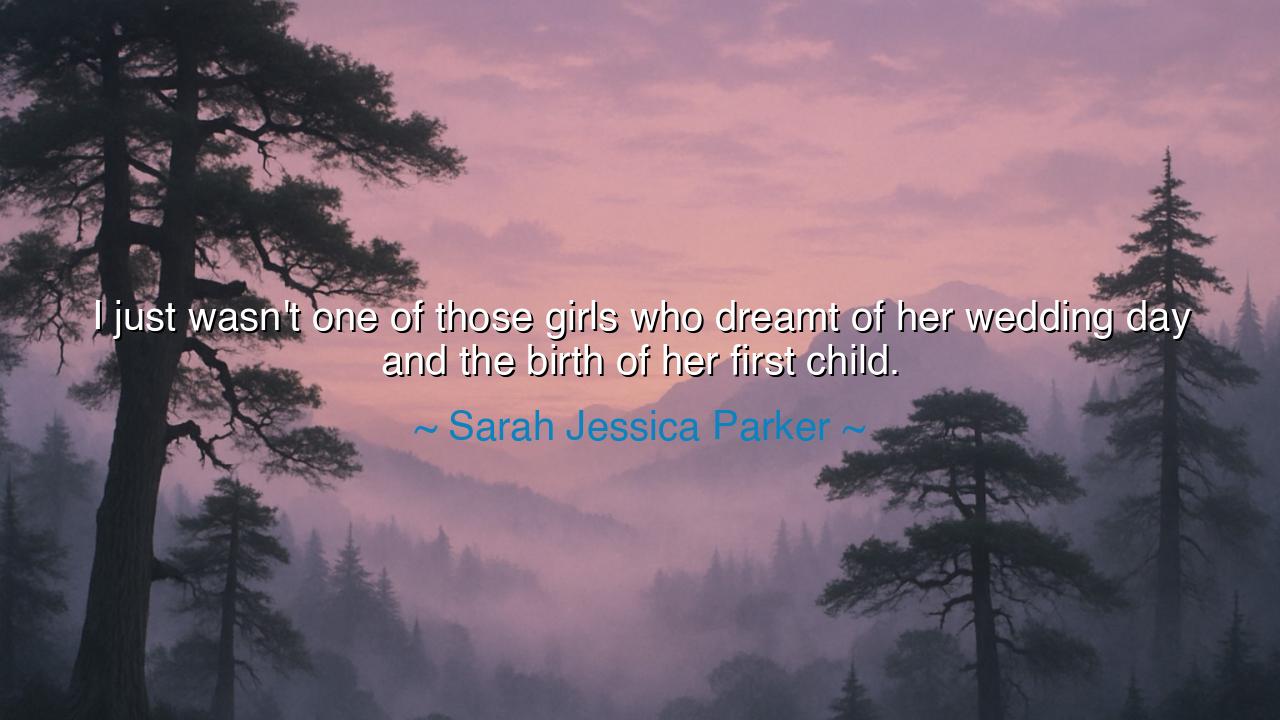
I just wasn't one of those girls who dreamt of her wedding day
I just wasn't one of those girls who dreamt of her wedding day and the birth of her first child.






In the words of Sarah Jessica Parker, we hear the voice of one who did not follow the path expected of her. She confesses, “I just wasn’t one of those girls who dreamt of her wedding day and the birth of her first child.” These words carry both honesty and strength, for they remind us that not every destiny is shaped by the same dreams. Where many are taught to long for veils and cradles, she found her spirit wandering elsewhere, into visions beyond the roles prescribed by tradition.
The ancients, too, knew of such divergence. Artemisia of Caria, a queen and warrior, did not devote her life to marriage or children, but to governance and battle. Her legacy was not lessened by this; rather, it was enriched, for she dared to claim her own story. So Parker’s words belong to a long lineage of women who refused to confine their worth to weddings and births, reminding us that life is vast, and that every soul has the right to dream its own dream.
Her reflection also shines a light on the burden of cultural expectation. In many lands and ages, young girls were taught to measure their future only by the day of the wedding and the hope of a child. To step outside this script was once unthinkable, even scandalous. Yet Parker’s declaration reveals a shift: that fulfillment may be found in art, in work, in friendships, in freedom—that the human heart is too large to be bound by a single vision of happiness.
History mirrors this in the life of Joan of Arc, who never wed, never bore children, yet became a beacon of courage for her people. Her destiny was not domestic but divine, not private but public. Just as Joan’s path was carved by voices and fire, Parker’s words remind us that each woman may claim her own path, whether it leads to the altar, the cradle, or elsewhere entirely.
Therefore, let this wisdom endure: that no single dream defines the worth of a life. The wedding day and the birth of a child may be sacred joys for some, but they are not the only measures of meaning. Parker’s confession teaches us that freedom lies in honesty, and that the truest destiny is not the one handed down by tradition, but the one chosen by the heart. For in daring to speak her truth, she leaves a gift for all who follow: permission to dream differently, and to live fully in the dreams that are their own.






GKGaming Kaiz
Sarah Jessica Parker's statement challenges the conventional idea that every woman dreams of her wedding and children. It's liberating to hear someone express a different viewpoint, one that values other aspects of life. It makes me question: how much of these 'dreams' are really personal aspirations and how much are influenced by cultural norms? In a world that constantly pushes the idea of the perfect wedding or family, is it time to redefine what success and fulfillment truly look like for women?
NKNgan Kim
Sarah Jessica Parker’s admission of not dreaming about her wedding day or the birth of her first child really opens up a broader conversation about expectations. It seems like there's a lot of pressure on women to follow a certain trajectory, but not everyone fits into that mold. Do you think women who don't envision these milestones face difficulty in expressing their unique desires, especially in a world where these moments are often seen as a measure of fulfillment?
MNMai Nguyen
I can really relate to Sarah Jessica Parker’s perspective. It’s so common for women to feel societal pressure to dream of weddings or children, but that doesn’t align with everyone’s path. I think her honesty about not having those dreams is empowering. It makes me wonder, though, do women who don’t prioritize those milestones face judgment or misunderstanding from others? How much of our future is shaped by our own desires versus what we’re ‘supposed’ to want?
ULUyen Linh
Sarah Jessica Parker’s statement about not dreaming of traditional milestones like marriage or children is refreshing. It challenges the typical narrative many women grow up with, where those moments are often considered essential. I wonder, does this reflect a more modern, individualistic view of life and success, where personal aspirations and career achievements take precedence? How do you think societal expectations affect the way women envision their future?